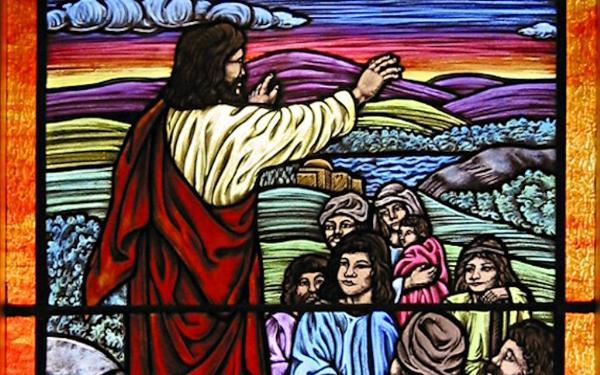Fr Jack Mahoney looks again at the Sermon on the Mount in Matthew’s Gospel, describing how the structure of the sermon can help us to understand what Jesus wanted to tell his disciples. What are we to make of the new righteousness, which ‘exceeds that of the scribes and Pharisees’, to which Jesus is calling his followers?
In a previous article for Thinking Faith I discussed ‘The Meaning of the Sermon on the Mount’, and explored its background and its role in the context of St Matthew’s Gospel, which is the only place in the New Testament (Matthew 5-7) where the sermon appears. Readers may care to refresh their memories of the previous article, or read it as a preparation for this one on ‘The Shape of the Sermon on the Mount’ and a concluding one to follow entitled, ‘Living the Sermon on the Mount.’
In ‘The Meaning of the Sermon on the Mount’, I summarised the structure of the sermon thus:
Whatever be its ecclesial provenance, from its content and inner structure Matthew’s Sermon on the Mount is evidently aimed at presenting an authoritative portrait of Christian discipleship. After a description of Jesus’s introductory healing ministry the scene is set in his ascending the hill and solemnly sitting down to address his disciples and the crowd of interested bystanders. In the opening section of his address he sketches in the Beatitudes a portrait of his followers … The main body of the sermon can then be identified as containing three sections to do with [their] relationship with God: one contrasting traditional Jewish moral teaching (of the scribes?) with new moral principles enunciated by Jesus; a second on the practice of ‘righteousness’ (Mt 6), religious and devotional practices as performed by the Pharisees, to be rejected now in favour of Christian practices; and a third section, less clearly composed than the previous two, which can be read as describing the true righteousness which is henceforth to be found and practised in the kingdom of God, and the complete trust and single-minded devotion which God’s sons and daughters are invited to manifest to their loving and protecting Father.
The sermon as a whole, then, describes what the followers of Jesus are expected to be like (5:3-16 [all references are to Matthew’s Gospel, unless otherwise stated]), and then how they are expected to behave, both in their moral lives (chapter 5), and in their spiritual and devotional lives (chapters 6 and 7). The comparisons that Jesus draws between what he is exhorting his followers to do and the ethical and devotional practices of the Jewish leaders are summarised in what is meant to be the key sentence of the whole sermon: ‘unless your righteousness exceeds that of the scribes and Pharisees, you will never enter the kingdom of heaven’ (5:20).
The Beatitudes
The opening section of the sermon is the famous passage known traditionally as the ‘Beatitudes’ (5:1-17), the word introducing each sentence in the Latin version being beatus, which means happy, or blessed, or even lucky or fortunate (macharios in the Greek). ‘Blessed are the poor in spirit… Blessed are those who mourn… Blessed are the meek… Blessed are those who hunger and thirst for righteousness… Blessed are the merciful… Blessed are the pure in heart… Blessed are the peacemakers… Blessed are those who are persecuted.’ It seems a strange list of characteristics for which people are blessed, or happy; but it actually provides a series of challenges posed by Jesus to those who wish to follow him then or later, making clear where their priorities in life should lie. If being a Christian means being poor, or downtrodden, or victimised, as Jesus was; if it involves trying to be gentle, understanding and reconciling, as Jesus himself set out to be; then Christians are all ‘blessed’, that is, fortunate, for they are imitating their Master in all these ways. They belong to God, and God is on their side: ‘theirs is the kingdom of heaven.’
The very first beatitude gives us an important clue as to what they are all pointing to. It is commonly observed that the equivalent in Luke’s Sermon on the Plain begins more simply, ‘Blessed are you who are poor’ (Luke 6:20), exemplifying Luke’s concern to show Jesus as particularly concerned for the economically poor and vulnerable in society. By contrast, Matthew writes, ‘Blessed are the poor in spirit’, giving Jesus’s teaching a more spiritual dimension which is consonant with the Old Testament teaching on ‘the poor of God’, the anawim, who were recognised as those who put all their trust in God and in his care for them. At the very opening of the Sermon on the Mount, then, Jesus invites all who aspire to follow him to be ‘poor in spirit’ in many ways – that is, never to be totally dependent on themselves or their worldly resources and assets, but relying always on God and on God’s love for them, whatever happens.
After welcoming his listeners by listing the blessings through which his followers can identify themselves with him, Jesus commends his disciples as ‘the salt of the earth,’ making it wholesome through their discipleship (cf. 2 Kings 2:21; Col 4:9), and as the ‘light of the world’ (5:13-16), enlightening others in their Christian witness. The commendation concludes paradoxically with a remark of great theological significance, the observation by Jesus that whatever good they do as his disciples they will in fact be doing through the power of their Father: ‘let your light shine before others, so that they may see your good works and give glory to your Father in heaven’ (5:16).[1] Matthew then concludes this introductory section of the sermon by having Jesus reassure those of his disciples who have come to him from Judaism that the Mosaic Law will not be set aside in his and their ministry. On the contrary, Jesus says, he has come ‘not to abolish but to fulfil’ the law and the prophets (5:17).
Commentators differ on what Jesus’s work of ‘fulfilment,’ or bringing to completion, amounted to, mainly on whether he did this in his teaching or in his life. In fact, it appears to have been in both. The mission of Jesus shows a basic continuity and fulfilment of the history of Israel, such that the death and resurrection of Jesus bring to completion the history and divine destiny of God’s people and fulfil the prophecies foretelling the coming Messiah. Not only does Matthew’s account of the passion and death of Jesus claim prophetic warrant from the Old Testament (‘the Son of Man goes as it is written of him’ [26:24; cf Mk 9:12]); in addition, in the following main section of the sermon he has Jesus pick out salient points of the Law, Old Testament moral teaching and religious practices, and give them a fuller, authoritative interpretation and commentary of his own.
The ‘righteous’ moral teaching of the scribes?
As we have already observed, in the main body of the sermon we can see three sections which spell out the new ‘righteousness’ expected of Christian disciples in their relationship with God: first, an updating of the Ten Commandments in the light of Jesus’s moral teaching, making it quite clear that they were not being dispensed with; then, an exhortation that disciples give a new quality to their regular religious practices of prayer, fasting and almsgiving, which is superior to that of the Jews; and finally, a stress on the need for total trust in God throughout their life. The first section, in the remainder of Matthew 5, contains six moral antitheses, contrasting the traditional Jewish teaching of the Ten Commandments with radical moral principles enunciated by Jesus, each introduced by ‘I say to you’ (Mt 5:22, 28, 32, 34, 39, 44). These go behind the letter of the commandments to the core of the external actions and behaviour which were forbidden by them, internalising morality and showing how it begins in the heart, long before the action takes place.
In addition, each new command enunciated by Jesus acts as a sort of magnet to attract other sayings by him on the subject and a point from which to expand into a mini-treatment of the topic being considered. Thus, in place of the Old Testament commandment forbidding the murder of a personal enemy (Ex 20:13), we are presented with a little treatise on anger towards others and what it can lead to, in terms of hatred, hostility and contempt (5:21-22). In addition, we are exhorted to be reconciled with anyone who has a complaint against us, even in preference to performing some act of religion (5:23-26). Again, in place of the commandment forbidding the act of adultery (Ex 20:14), we are given a discourse on interior and external chastity which has its basis ‘in the heart’ and which avoids occasions of sinful looks or contacts (5:27-30), with a corollary forbidding divorce (5:31-32).[2] Thirdly, in place of the Mosaic commandment forbidding false oaths (Ex 20:30:7), we are instructed by Jesus to avoid all taking of oaths and any circumlocutions, to simply tell the truth in all we say (5:33-37).
Finally, the Old Testament lex talionis, or legal provision for due compensation for injury in terms of ‘eye for eye, tooth for tooth’ etc. (Ex 21:24), which was probably originally aimed at keeping retribution and vendetta within bounds, is rejected by Jesus in favour of total non-resistance towards ‘an evil-doer.’ Here are to be found the famous phrases about turning the other cheek, and going the extra mile. In short, we are to be totally ungrudging to others: ‘give to everyone who begs from you, and do not refuse anyone who wants to borrow from you’ (5:38-42). In fact, Jesus continues, the old maxim about loving your neighbour – but being allowed to hate your enemy – is now totally subverted for his disciples as they try to live under God’s rule. The term ‘enemy’ is expelled from the Christian vocabulary, the universal rule now being to love even one’s enemies, going well beyond worldly standards (5:43-47). Later theologians and spiritual writers were to take up the following words of Jesus and remove them from their context to construct a whole spirituality and library of religious ‘perfection,’ built on the exhortation of Jesus to his followers to, ‘Be perfect [teleios], therefore, as your heavenly Father is perfect’ (5:48).[3] In fact, as the ‘therefore’ confirms, he was simply instructing his disciples to take after their Father in being all-embracing – that is, non-discriminatory and non-partisan – in their love, just as God sends his weather on everyone without exception, however righteous or unrighteous they may happen to be!
The ‘righteous’ practices of the Pharisees?
Having sketched Jesus’s moral teaching for the sake of his Jewish-Christian community, Matthew now turns in chapter 6 to the religious and devotional practices which his followers should pursue as they practice their ‘righteousness’ in almsgiving, prayer and fasting, in deliberate and polemical contrast, perhaps, to the ways of the Pharisees (6:1). It is interesting to note that in the document we possess in the Didache, or ‘Teaching of the Apostles’, written slightly later than the gospels, possibly in Syria, fasting was a regular feature for Christians, but they were warned not to fast like the ‘hypocrites’ (i.e., the Jews): ‘they fast on Mondays and Thursdays, but you fast Wednesdays and Fridays’. Nor, according to the Didache, are Christians to pray as the ‘hypocrites’ do, ‘but as the Lord commanded in His gospel’, reciting the ‘Our Father’ three times a day.[4] Here in the sermon, by contrast, Matthew’s concern is that the fasting, prayer and almsgiving of Christians should indeed be different from that of the ‘hypocrites’, differing, however, not so much in quantity or time as in quality or motivation. Their devotions should not be performed ostentatiously, for show or for recognition and admiration by their fellows, but genuinely and ‘secretly’, to be known only to God, who will give all the recognition that is appropriate (6:2-18).
It is in his description of how the disciples should not in their prayer ‘heap up empty phrases’ like the Gentiles, that Matthew gives them and us his version of the ‘Our Father’, the Lord’s Prayer (6:9-13). This is not to be found in the earlier gospel of Mark, but it also occurs in Luke 11:2-4 in a very similar version, suggesting that Matthew and Luke both adopted it from Q, a shared source unused by Mark. There is debate about whether the ‘Lord’s Prayer’ is proposed as the single, formal prayer which it rapidly became, as in the Didache, or was initially a list of the topics on which Jesus instructed his disciples to focus their prayer. The phrase well known to Protestants, ‘For thine is the kingdom, and the power, and the glory, for ever. Amen’ is found concluding the prayer in some early Greek manuscripts of Matthew and is best attested to in chapter eight of the Didache. It is not to be found, however, in the earliest Greek manuscripts of Matthew, and in modern translations it is regularly relegated to a footnote. Nor did it occur in the early Latin Vulgate version of the Bible which was officially adopted in 1546 by the Catholic Church in the Council of Trent,[5] but it did figure in the Greek manuscript that was used by the composers of the King James Bible during the Reformation in 1611. In 1969 it was introduced, perhaps ecumenically, into the Catholic celebration of the Mass to follow the Lord’s Prayer.
The superior righteousness of the Kingdom
The third section of the Sermon on the Mount (Mt 6:19-7:28) is more obviously a stringing together of earlier sayings of Jesus. It can be read, however, as addressing the inadequate righteousness of the scribes’ reading of the Commandments and the inadequate righteousness of the Pharisees in their religious and devotional practices. Here are to be found the well-known sayings of Jesus about where one’s true treasure is to be found (6:19-21), the need to serve God rather than wealth (6:24) and the graphic description of how the disciples of the Kingdom are not to be worried about their future (6:25-34). What counts above all is what we have identified as the key topic of the whole Sermon, to ‘strive first for the kingdom of God and his [or its] righteousness [diakaiosune], and all these things will be given to you as well’ (6:33).
Nor, on pain of being judged similarly themselves by God, must Christians judge others or concentrate on the speck of dust in their neighbour’s eye while ignoring the beam of wood in their own (7:1-5). The puzzling injunction not to give to dogs what is holy, nor to throw pearls before swine (7:6), appears to be a warning against profaning the sacred – perhaps enjoining care about who is to be admitted to share the community’s Eucharist, as the Didache interprets it.[6] Disciples should be confident that their asking, searching and knocking for attention will all be satisfied by their Father in heaven (7:7-11), and concern recurs about their attitude to others, with the famous ‘golden rule’ added: ‘In everything do to others as you would have them do to you; for this is the law and the prophets’ (7:12).
This ethical maxim is recognised as widespread, existing in a number of variations in many of the world’s religions and philosophies; it may seem strange to find it cited here as summing up the entire treasury of Jewish religion and morality, especially since later in Matthew, Jesus identifies all the law and the prophets as hanging, not on the golden rule, but on the great commandment(s) of love of God and love of neighbour (22:36-40). The Sermon appears to be degrading the supreme moral maxim of Israel, and of Christianity, in equating it simply with the need for reciprocal respect with other people, treating them as one would have them treat oneself.Surely more needs to be said; and this has to be done in terms of filling out in what ways such mutual respect is to be expressed. If I am a drug addict, the golden rule cannot imply that I generously provide drugs for others on the grounds that I would hope they will keep me supplied also. If I am a masochist, it cannot mean that I treat others cruelly because that is how I like to be treated myself. The indispensable supposition that makes the golden rule work ethically is that I possess certain moral values and standards about how I wish to be regarded and treated by others, in terms of respect for my personal and unique dignity and of concern for my best interests; and these identify in what way I ought therefore to act towards everyone else.
As the Sermon on the Mount moves to its conclusion (Mt 7:15-27), it contains some closing warnings on how seriously it must be taken, on the need to avoid ‘false prophets’ (teaching otherwise in the community?) and on the importance of actually putting into effect Jesus’s instructions, which are daringly identified with ‘the will of my Father in heaven’ (7:21). The parable of the two houses, one surviving and one collapsing depending on their contrasting foundations, confirms the need for action and not just listening (7:24-27); and in conclusion, ‘the crowds were astonished at his teaching, for he taught them as one having authority, and not as their scribes’ (7:28-29). This, if we look to the end of Matthew’s Gospel, is the ‘authority’ in heaven and earth which the risen Jesus claims he has been given, as he sends his apostles to share his teaching throughout the world, confident that Jesus will be with them ‘until the end of the age’ (Mt 28:18-20).[7]
The shape of the Sermon on the Mount, the first major teaching of Jesus at the beginning of Matthew’s Gospel, thus confirms its purpose as describing for the followers of Jesus who are being formed into the new people of God how they are to live and behave as they come under God’s rule and enter God’s kingdom. For centuries, the sermon has also been considered as providing the epitome of Christian morality and religious devotion. Yet many people are known to have found it difficult, if not impossible, to observe in all its requirements, with the reaction that attempts to explain it are charged with actually explaining it away! This dilemma will be explored in my final article, ‘Living the Sermon on the Mount’.
Fr Jack Mahoney SJ is Emeritus Professor of Moral and Social Theology in London University and a former Principal of Heythrop College, University of London. His next book, Christianity in Evolution: An Exploration, will be published this autumn by Georgetown University Press, Washington, D.C.
[1] On how this idea was developed in John’s Gospel, see J. Mahoney, ‘The Glory of God in St John’s Gospel’, The Way, January 2011, 21-37.
[2] ‘Except on the ground of unchastity’ (5:32), on which see J. Mahoney, ‘Grounds for Divorce in St Matthew’, Thinking Faith, 25 August 2009.
[3] When I was training as a Jesuit, we were expected to become familiar with the two-volume 17th century classic by the Spanish Jesuit, Alphonsus Rodriguez, entitled The Practice of Perfection and Christian Virtues.
[4] Milavec, A., The Didache: Faith, Hope & Life of the Earliest Christian Communities, 50-70 C.E. (New York: Newman Press, 2003), chapter 8.
[5] Decree on the Vulgate Edition of the Bible, DS 1506.
[6] Didache, §9.
[7] On God’s being ‘with’ one, see J. Mahoney, ‘God with us’, Thinking Faith, 12 August 2009.
![]() ‘Living the Sermon on the Mount’ by Jack Mahoney SJ
‘Living the Sermon on the Mount’ by Jack Mahoney SJ
![]() ‘The Meaning of the Sermon on the Mount’ by Jack Mahoney SJ
‘The Meaning of the Sermon on the Mount’ by Jack Mahoney SJ






